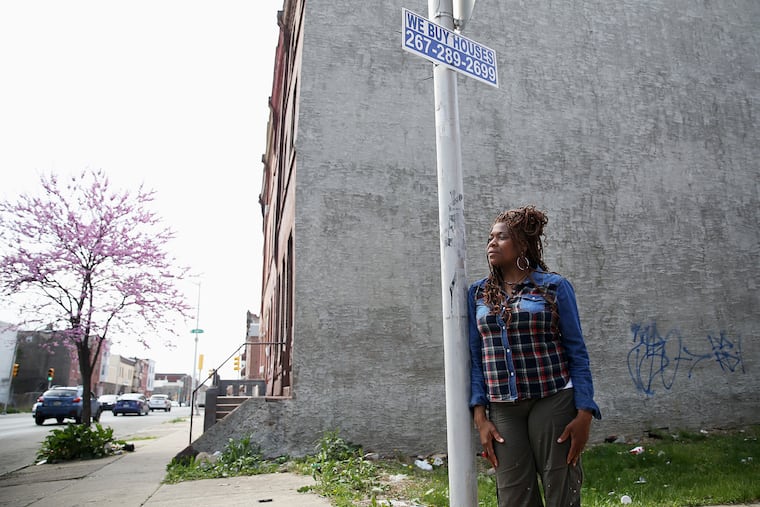Philly’s new homeowner protection law is a useful tool for neighborhoods facing gentrification | Editorial
A new city law set to take effect in 2021 will regulate "wholesalers" who buy residential real estate in gentrifying neighborhoods at bargain prices and resell it for big profits.

Philadelphia City Council’s unanimous Nov. 19 vote to protect homeowners from unlicensed real estate wholesalers — known for those “we buy houses for cash” posters on utility poles — could help empower residents in neighborhoods on gentrification’s next frontier. Sponsored by Councilmember Allan Domb, himself a Realtor, the new law will establish licensing and regulatory requirements for wholesalers, who rather than buy properties outright, make lowball offers and then sell the sales contracts at inflated prices. The homeowner sells for less than what the house is worth and the wholesaler pockets a profit.
Some tactics recall the “blockbusting” that disrupted many city neighborhoods in the 1950s and ’60s. Then, some white homeowners in West and Northwest Philadelphia were bombarded with phone calls and racist fliers urging them to sell fast at bargain prices because the city was beginning to integrate. Sowing panic, unscrupulous buyers then sold properties to Black purchasers at inflated prices.
The new variation on that predatory practice seeks to separate unsuspecting residents, including senior citizens, from their homes — often, the owner’s most valuable asset and sole source of wealth — at prices far below what a neighborhood’s rising values may command. As residential development has continued to radiate outward from Center City in recent years, parts of North, West, and South Philly face unprecedented gentrification pressures. Organizations such as the Strawberry Mansion Community Development Corporation and Community Legal Services, as well as council members, have noted an increase in complaints about unsolicited, high-pressure, and sometimes misleading sales pitches.
Testifying at a council hearing on the new regulations, a retiree named Blondelle Murphy described how her family home near the Temple University campus was nearly lost after an elderly relative living there responded to a solicitation and sold it for $31,000. The buyer drove the seller to City Hall to complete the paperwork; the house, which the family was forced to file a legal challenge to reclaim, is worth more than $200,000.
» READ MORE: New city law aims to crack down on real estate ‘wholesalers,’ seen as exploiting underinformed property owners
The new law would require background checks for applicants seeking a wholesaling license and punish wholesaling without a license by invalidating agreements and imposing fines or other penalties. Domb — who describes wholesalers as “stripping wealth out of communities”— and other advocates said the new law also includes provisions aimed at giving sellers more information, more time to consider a sale, and more opportunities to get information from the city or real estate professionals.
Residents can sign onto a do-not-call list to stop receiving unwanted sales pitches; the community organizations also plan “seller beware” education programs. Advocates said this provision also serves to protect owners contacted by real estate “flippers,” like those described in an Inquirer story in September, who like wholesalers are prospecting in neighborhoods where real estate values are expected to rise. The regulations will not apply to private buyers seeking to invest in their new properties, or to community development organizations looking to increase the affordable housing supply.
By itself, this new law won’t head off gentrification. But it could help slow the process and help keep the wealth from rising neighborhood real estate values where it belongs — in the hands of residents.